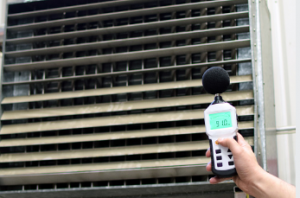There are many different types of decibel meters. One type is known as a data hold decibel meter, which is popular because of its low and high-level displays. The two-way switches enable the user to select various levels of background noise. Besides, it also has a data-hold button and a long battery life. However, it has some drawbacks, including poor accuracy and display.
 The PT02 compressor microphone is a typical example of a decibel meter. It measures sound levels over a single range. It can detect sounds from 30 decibels to 130 decibels, with the low frequency up to 1.5 dB and the high frequency up to five dB higher or lower than the indicated measurement. This type of meter takes two measurements per second. The average of all the measurements from the previous second is displayed on display. This meter balances the peaks and valleys of sound in most audio applications.
The PT02 compressor microphone is a typical example of a decibel meter. It measures sound levels over a single range. It can detect sounds from 30 decibels to 130 decibels, with the low frequency up to 1.5 dB and the high frequency up to five dB higher or lower than the indicated measurement. This type of meter takes two measurements per second. The average of all the measurements from the previous second is displayed on display. This meter balances the peaks and valleys of sound in most audio applications.
Different types of decibel meters are made for specific purposes. Some are intended for continuously monitoring noise levels and recording the data on a CD or DVD, while others have data-logging capabilities. A higher-priced model can transfer the recorded data to a computer for analysis. Some even include a computer document that allows users to view the recorded data. These decibel meters are most common in the construction industry, where constant exposure to loud noise can cause physical damage.
A decibel meter is a tool used to measure noise levels, and this instrument is typically a hand-held device with a microphone. Condenser microphones offer a balance between accuracy, stability, and reliability. Choosing a high-quality condenser microphone is essential if you’re using your decibel meter for professional purposes. You can also use a mobile phone App to measure sound levels.
Features of a decibel meter
A decibel meter is a device used to measure sound levels in industrial environments. They are commonly used for on-site measurements and long-term monitoring of various noises. For example, industrial Hygienists and Workplace Safety Professionals use decibel meters to monitor workers’ exposure to noise. They also conduct regular noise surveys to collect sound-level data. Their primary goal is to create quieter products for industrial users.
The display shows the sound level in decibels and the selected frequency weighting. Some units have other features, such as a record function or an auxiliary input for an external instrument. Decibel meters often come with an auto-ranging feature or can be manually adjusted. Whether you need a sound level meter for one-time measurements or several, make sure the model you choose offers a range of 30 to 130 dB.
Classification of sound level meters
Several types of sound level meters exist. They can measure the decibel level of sounds at different frequencies and can be calibrated according to predetermined parameters. The most commonly used sound level meters are A-Weighting, Low-Weighting, and Pulse-Weighting. Below are the various types of sound level meters. Each has its advantages and disadvantages. Read on to learn about the different types and their classification.
A class 1 sound level meter is ideal for measuring noise levels in buildings, schools, and hospitals. It features an extensive dynamic range, data logging, and overload detection. It measures noises of different frequencies from twenty to fifty-five decibels. A professional sound level meter will measure up to 140 dB and is more accurate and reliable than a class-B meter. In addition, a high-quality class-A sound level meter is available for use in scientific research.
Another type of sound level meter is a general-purpose sound meter. This instrument measures noise levels in general environments and records data for later frequency analysis. These meters are typically cheaper than Class-A sound level meter devices. A vital feature of this type of meter is its microphone, and the quality of the microphone will determine the accuracy and precision of the sound level data. For example, a class-A sound meter will have a higher sensitivity to high-frequency sounds than a Class-B sound level meter.